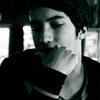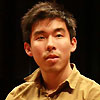Chris Bourke Interview
This is an edited transcript of the Chris Bourke interview with Douglas Lilburn - to our knowledge, the most in-depth surviving audio interview. It was recorded for a Listener article on 3 October 1985 at Douglas's Ascot Terrace home in Wellington. An abridged version appeared in Music in New Zealand in 1995. The original cassettes are now part of the Douglas Lilburn collection at the Alexander Turnbull Library in Wellington.
Chris: Wonderful 1940 Headline: "Enter the man who won the laurels"
Douglas: Actually it was a bit like that because I stepped off a boat in August 1940 and one of the first things that greeted me was the news that I'd won this money. Money was pretty important in those days, no job, no income, two first prizes and a second added up to a good deal, gave me a bit of confidence to carry on. Then when I went back to Christchurch and really started to work down there, this gave me some backing, together with what I could earn from freelancing.
Chris: Put a stamp on it that was going to be your life.
Douglas: I think it did do that, I think everybody was too busy with the war to take too much notice of music.
Chris: What music was in the family during childhood.
Douglas: Very little, my mother was musical but had no training at all, my two sisters played the piano, the usual things, the Moonlight Sonata, Liebestraum and bits of Grieg…
Chris: Quite a bit older than you.
Douglas: Yes I was the youngest of seven, and not destined to be a farmer, so really they weren't too concerned when I showed an interest in music.
Chris: Other children older, so like an only child.
Douglas: In a sense I was, because the nearest ones were five years older, and when they went off to boarding school and my parents went overseas I was left almost as an only child in the Drysdale house.
Chris: Music lessons.
Douglas: Nothing at all until I was about ten or eleven, when I was at the Friends' School in Wanganui. It was a Quaker school and it gave me the best education I've had in my life, it was a marvellous place - it was so imaginative and it left oneself free and you were given assignments for a term and you worked at them at your own speed with no pressure…
Chris: At the age of ten.
Douglas: ...And we learnt French for instance by speaking French, we had French teas and things like that, we wrote our own plays and acted in them. I think it was unique in those days.
Chris: Significant in forming your interests.
Douglas: I think it would be because I enjoyed it so much, when I went on to another school in Wanganui, St George's, I found the teaching was good, but it was severe.
Chris: How did you amuse yourself while on your own.
Douglas: Well there were all these thousands of acres around and you could wander all over them, swimming, build houses in trees, chase turkeys over the hills, and all the farming things that went on and of course one was encouraged to work in the house, in the garden, to take part in everything, which of course was very good training because you never got bored, there was always plenty to do and one enjoyed doing it. But music - there really wasn't anything of significance at that time.
Chris: No record players everywhere like now.
Douglas: We had an old gramophone at the beach house, which was wrecked by the time I was interested in it. But I did in fact find I could play the Hallelujah Chorus by winding the disc around with my fingers. But really I had no serious music training until I was about seventeen.
Chris: Near end of time at Waitaki Boys High School. Also, no music among extramural Otago courses.
Douglas: None. I had no idea at all about the theory of music; it was my intuitive feeling for it.









